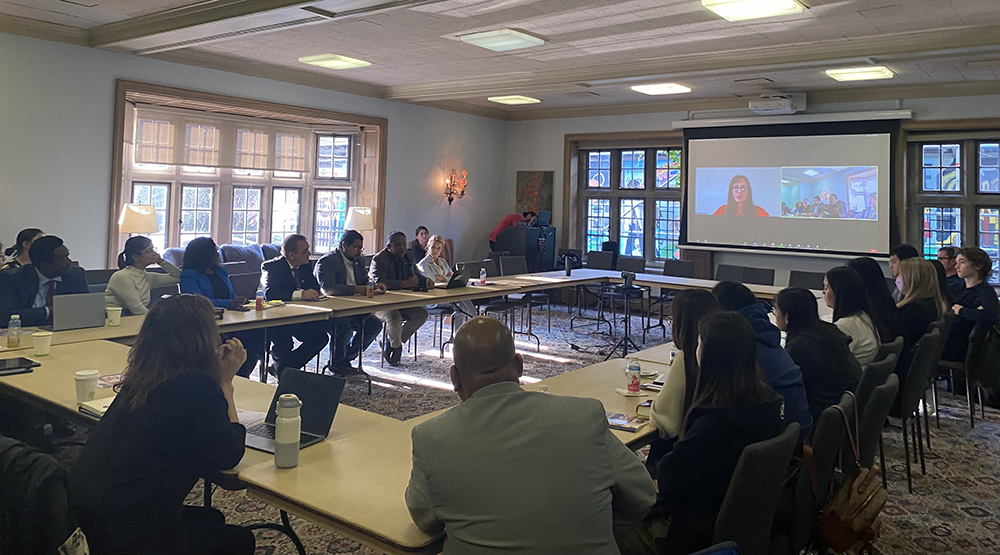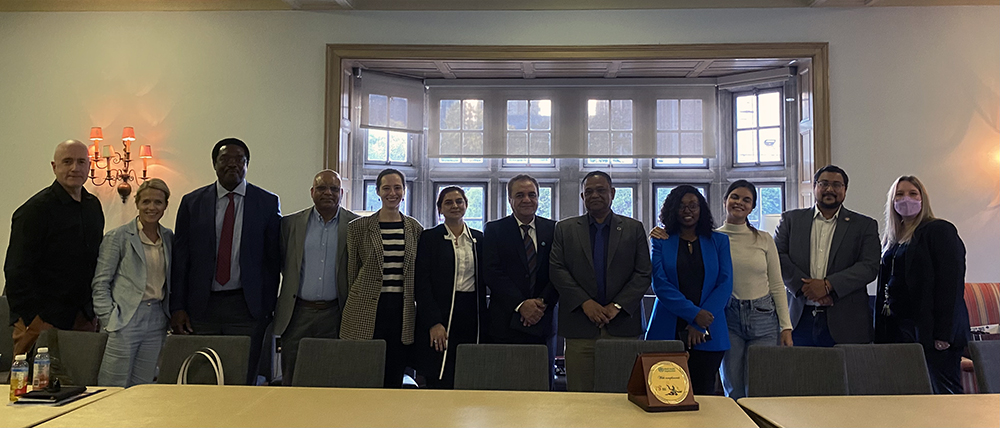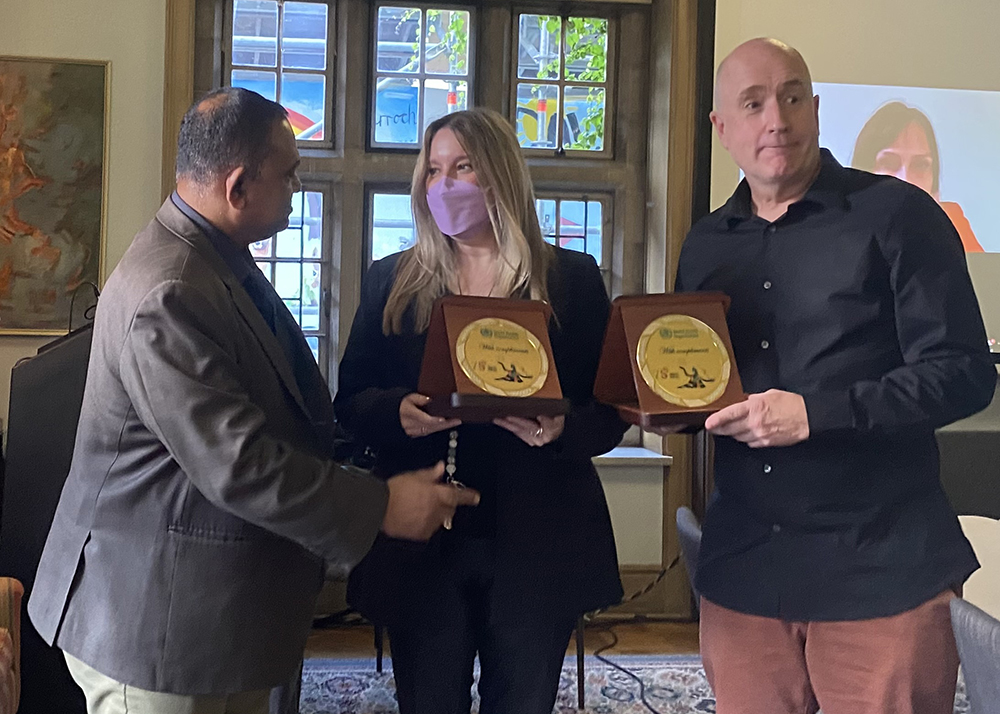Trinity College hosts WHO Conference on Global Health in Somalia and the Greater Horn of Africa

The Health Challenges in Fragile States: Spotlight on Somalia and the Greater Horn of Africa conference took place on September 14, 2023 at Trinity College. Students and professors had the opportunity to listen to and enter into dialogue with World Health Organization (WHO) Somalia representatives.
Dr. Mamunur Rahman Malik, WHO Representative and Head of Mission to Somalia, believes that opportunities to explore solutions to extremely challenging problems can arise in times of crisis: “To find them, you need to be innovative, you need to be contextualized.”
In joint partnership with Trinity College’s Margaret MacMillan Trinity One and International Relations Programs and the International Issues Discussion (IID) series at Toronto Metropolitan University, Health Challenges in Fragile States: Spotlight on Somalia and the Greater Horn of Africa brought together representatives from WHO to engage in a meaningful dialogue with University of Toronto students and scholars on health burdens, challenges, emergencies and opportunities in Somalia. The dialogue also branched into experiences working in global health and investigations of the places where academia and practical field work meet as the WHO officials work to improve Somalia’s fragile health environment.
Established in 1948, the World Health Organization (WHO) is an agency under the United Nations mandated to provide global health resources and support, especially to those countries whose health care systems are fragile and unpredictable. Somalia is constantly challenged by the unpredictability of disease outbreaks and the fragility of the healthcare system. The global health pandemic only exacerbated Somalia’s ongoing health challenges, putting a larger strain on the country’s already fragile health care system. While COVID-19 made clear to everyone what it means for our own health care systems to be under severe strain, many countries like Somalia have health care systems that are in a constant state of fragility and fatigue.
Many Somalians are living in hunger, due to crop failures and droughts. Somalia, extreme hunger and drought remain the leading causes of infant mortality for children under the age of five. In 2022 alone, it is estimated that drought and extreme hunger killed 43,000 people, half of whom were infants under the age of five. According to Liesbeth Aelbrecht, Incident Manager for the GHoA at WHO, in the Greater Horn of Africa (GHoA), almost 60 million people are living on one meal a day. Furthermore, Somalia and other countries in the GHoA remain vulnerable to extreme weather events that cause droughts and crop failure, which Aelbrecht says are clearly linked to climate change.
Some of the challenges in Somalia are beyond the scope of global health. Ongoing armed conflict arising in the country makes delivering health services in Somalia even more complicated. According to Field Security Advisor Wendell Flemming, WHO still has to go into these communities and work and function and said that mandatory security training, security officers on site, and armed escorts are all vital precautions for entering potentially adverse areas to carry out health care programs.
The challenges presented in Somalia and the GHoA are ongoing, but the WHO Somalia team has confronted these challenges up close and used a contextualized approach to come up with innovative solutions.
Oxygen cylinders are used to help patients regain regular oxygen levels. They are often needed for critical COVID-19 patients, whose oxygen levels can drop dangerously low. However, electricity, which is not available in most Primary Health Care Centres (PHCs), is needed to deliver the oxygen to patients. Somalia found that solar-power oxygen-cylinders could be used in PHCs with no electricity. As a result, oxygen cylinders are now saving lives in Somalia.
Dr. Malik’s study found that these oxygen cylinders have the greatest positive impact on children under the age of five, the largest demographic affected by respiratory illnesses. Solar-powered oxygen cylinders can also be used to fight other respiratory illnesses common in Somalia, like pneumonia.

In order from left to right, Dr. Arne Kislenko (Professor, Trinity College), Louise Agersnap (Head of WHO Innovation Hub), Wendell Flemming (Field Security Advisor), Saeed Ahmed (Reports Officer), Katy Mackey (Programme and Donor Support Officer), Fouzia Bano (Communications Officer), Dr. Farid Muhammad (Medical Officer / Team Lead, Expanded Programme on Immunization), Dr. Mamunur Rahman Malik (WHO Representative to Somalia), Dr. Mary Karanja (Technical Officer, Health Emergencies), Maria Tuane Linhares Pereira (Administrative Associate), Kyle DeFreitas (Team Lead, External Relations), Dr. Joy Fitzgibbon (Professor, Trinity College).

Dr. Joy Fitzgibbon (middle) and Dr. Arne Kislenko (right) accept a recognition award from Dr. Sk Md Mamunur Rahman Malik (left).
Solar energy can be implemented in other parts of PHCs. Most infant mortality in Somalia is preventable. “Evidence has clearly shown that the best investment you can make is in the immunization of children,” Dr. Malik says. However, storing vaccines requires electricity. Again, Dr. Malik points out, solar energy is a readily available resource: “Access to reliable electricity can make a difference between life and death.”
Students and scholars can take on a crucial role in improving Somalia’s health care system. Kyle DeFreitas, Team Lead in External Relations at WHO Somalia, says from his experience working in the WHO, that you need all types of people to run the organization.
While the WHO Somalia team comes together to help on the ground, scholars can generate work that supports their findings. “We can run programs, but not generate evidence,” Dr. Malik says.
Solutions to Somalia’s health care crisis that take an innovative, contextualized approach, such as using solar energy in PHCs without electricity, are proving worth the investment. As fragile as Somalia’s health care system and security situation remain, hope is certainly not lost. The WHO Somalia team’s strides in global health are no doubt an incredible inspiration for facing complex global health challenges.
Trinity College student Portia Garnons-Williams is an International Relations Stream Mentor in the Margaret MacMillan Trinity One Program and Leadership Team Member for the International Issues Discussion Series (IID). Portia is a second-year student, studying Political Science and International Relations. All photos by Portia Garnons-Williams.
Categories: International Relations; Student News; Trinity One


